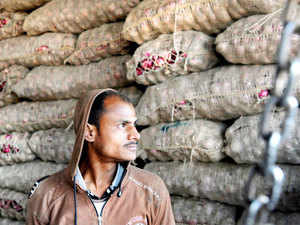
For regular supply of fruits and vegetable, the government plans to roll out integrated supply chain around 25 major cities of the country.NEW DELHI: The government is closely monitoring the demand and supply of agricultural products and regularly interacting with mandis and top officials of states. This has helped ensure smooth supplies during the lockdown, officials said.
“We have ensured that there is no shortage of TOP (tomato, onion and potato) in any state. There is no scarcity of these three essential horticultural items. Only thing is stitching supply and demand together. We are coordinating with supply and consuming states for uninterrupted delivery,” said an agriculture ministry official.
He cited the smooth supply of onions as an example of good coordination.
“We have bumper production of onion this year. Only thing we have to do is to ensure adequate supply from mandis in Maharashtra. As against 250 trucks in normal conditions, 350 trucks of onions are plying every day from Maharashtra to various parts of the country,” the official said.
He said 1,600 of India’s 2200 mandis had started operation.
“We are closely monitoring that social distancing and sanitisation is followed in mandis,” he said.
For regular supply of fruits and vegetable, the government plans to roll out integrated supply chain around 25 major cities of the country.
The supply chain will have farmers, farmer groups, farmer producer organisations (FPOs) and their cooperatives as stake holders. State agencies and large cooperative societies will also be involved in creation of large infrastructure and distribution networks as per requirement.
The government will adopt a cluster approach and collection centres will be created at every cluster for centralised procurement. New FPOs may be created to extend bargaining power to farmers at local level.
“Names of cities are being finalised. This will help in direct marketing of fruits and vegetable to bulk consumers and food processing units bypassing middlemen and mandi. This will ensure fresh supply to end users and maximum value to farmers,” said a senior agriculture ministry official.
For rolling out integrated supply chain, state governments will have to relax APMC rules to allow farmers sell their produce directly to bulk buyers bypassing the mandi. Some states have already relaxed the rules.
Experts said that the launch of integrated supply chain will help consumers and farmers.
“This supply chain is an integration of farmers, farmers groups, cold chain owners, transport and bulk purchasers in form of big retail companies, food processing companies and hotels. This will ensure delivery of fresh produce with maximum benefits to farmers,” said P K Joshi, fellow at National Academy of Agriculture Science (NAAS).
Joshi said the lockdown is the right time to start the pilot as farmers are heavily distressed as they are not able to sell their produce.
Source: indiatimes.com

